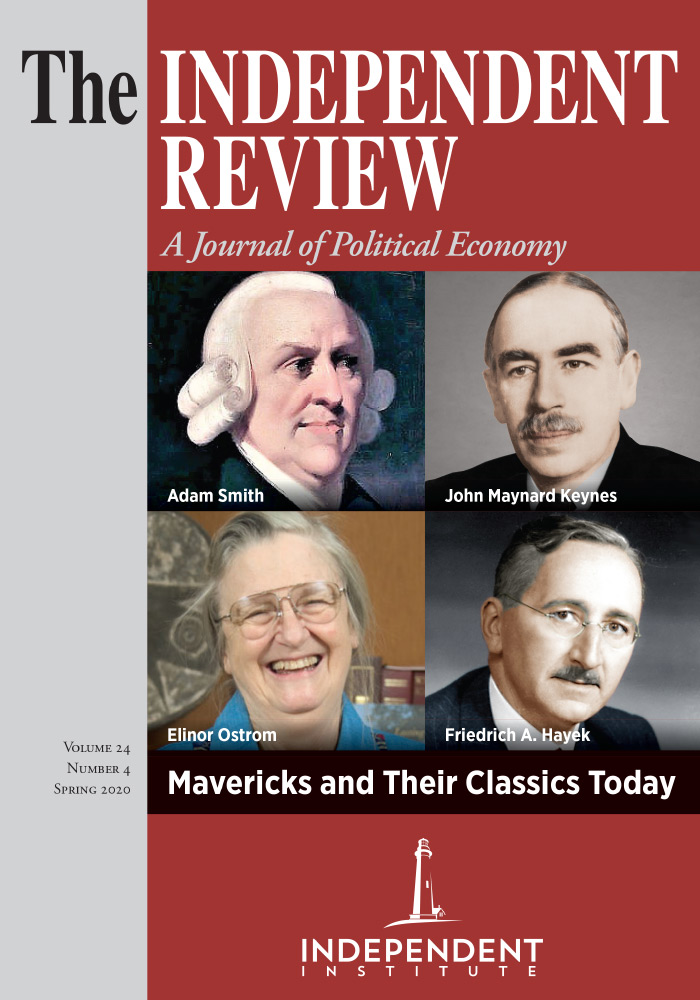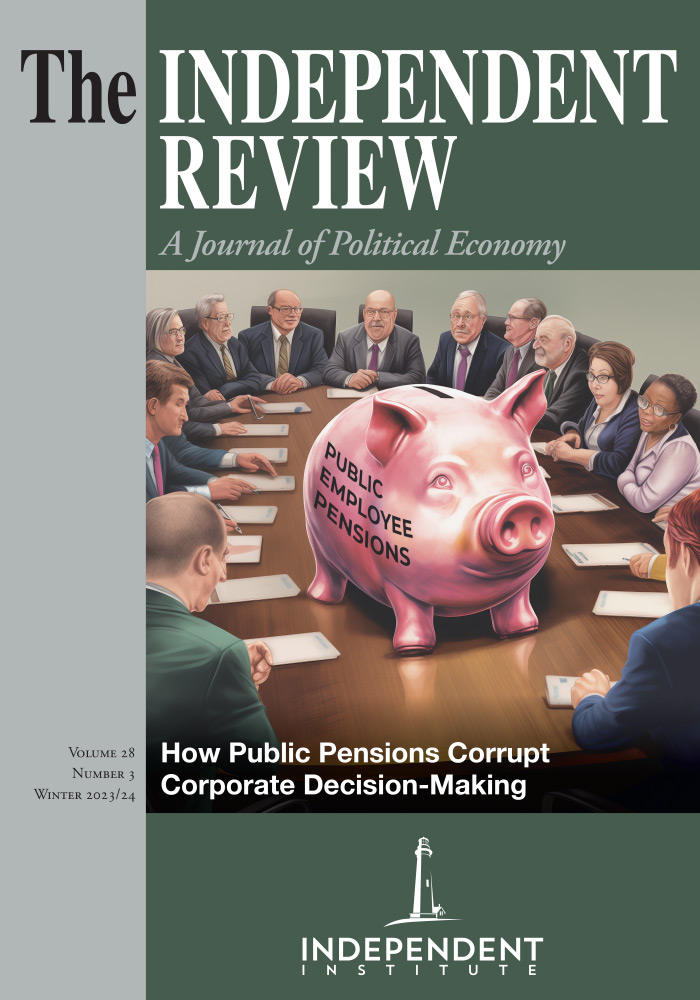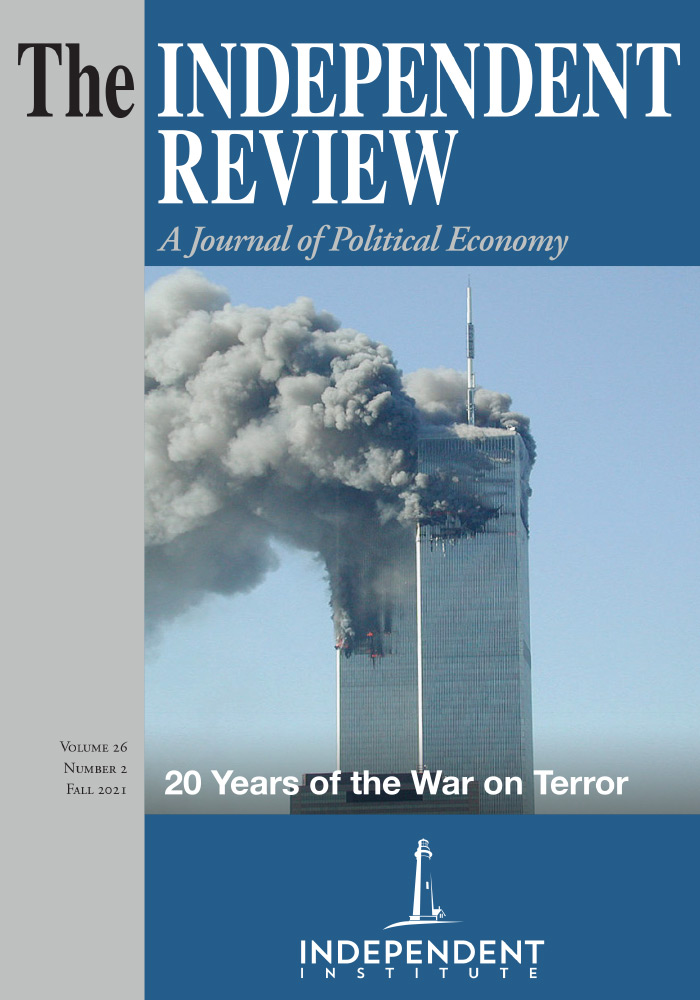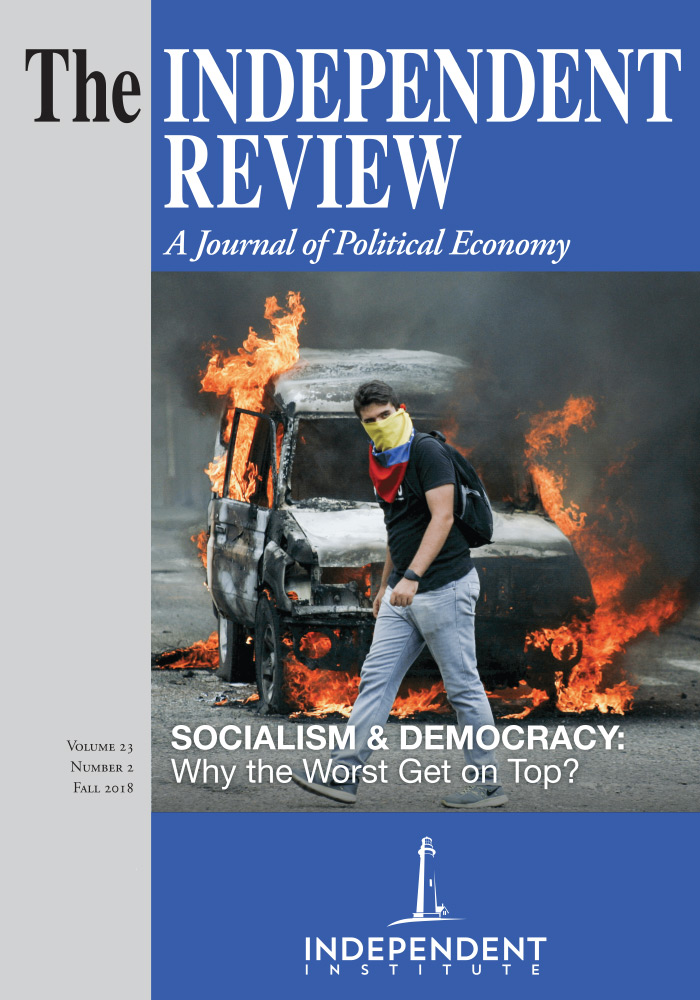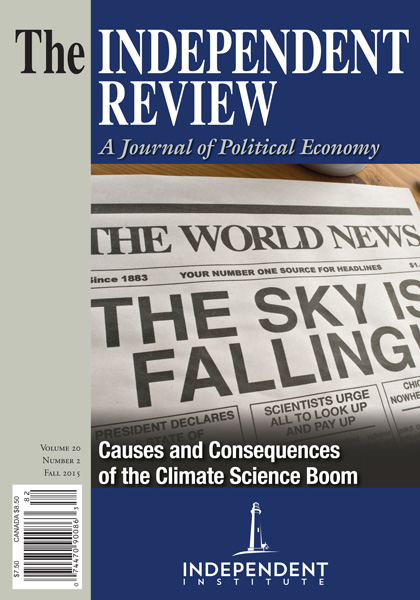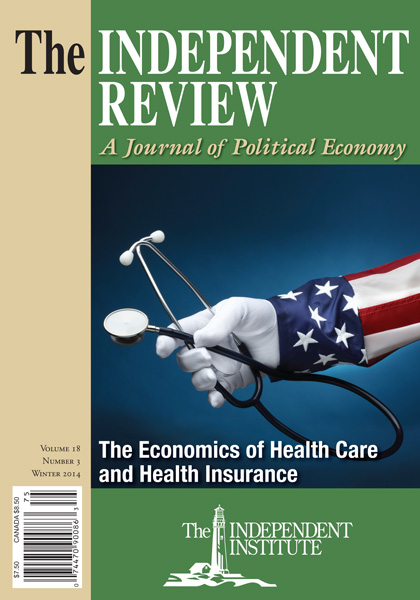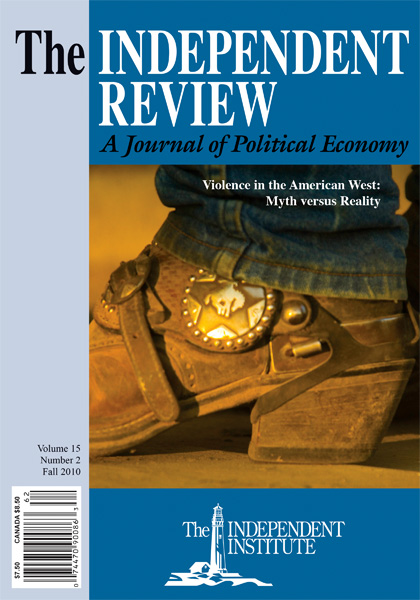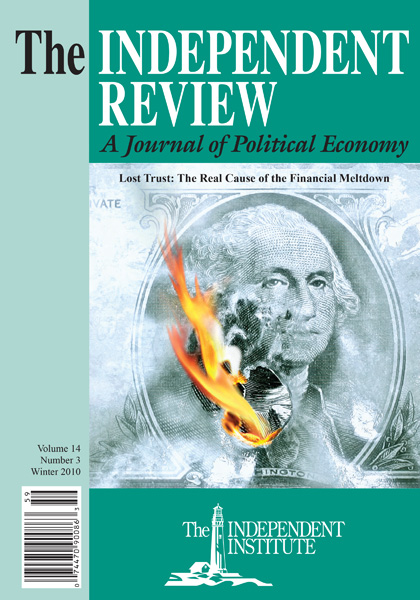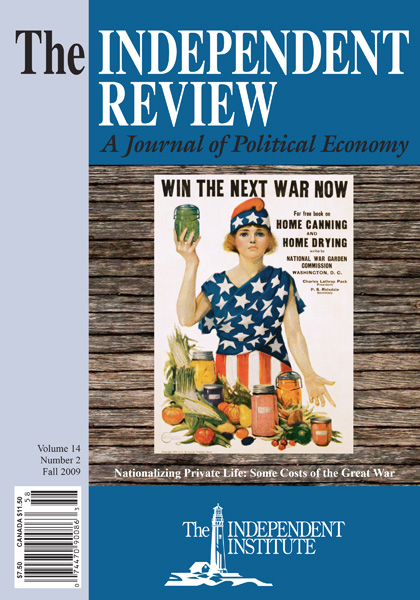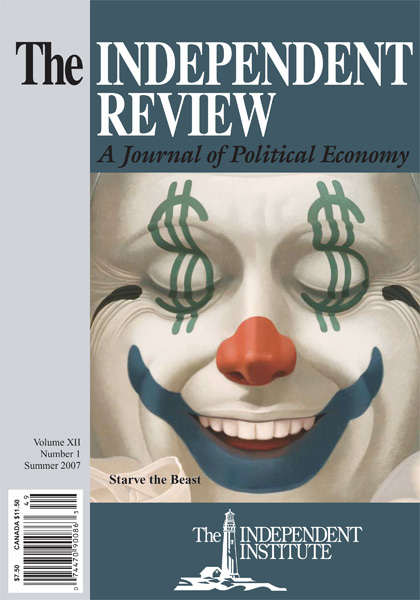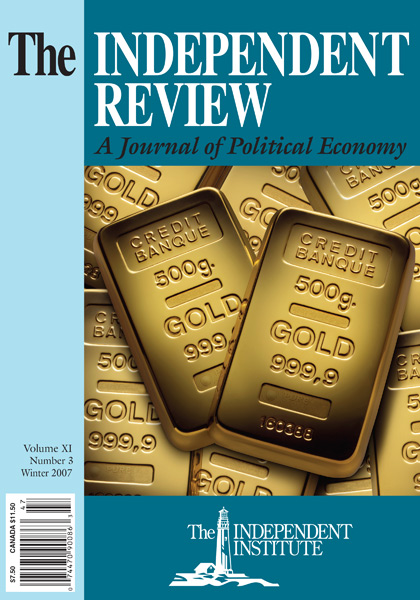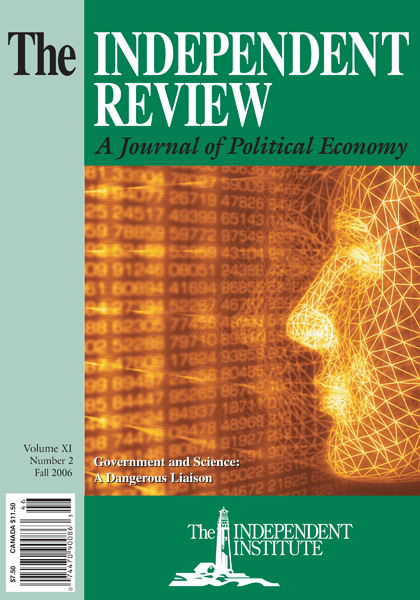The Scottish economist and moral philosopher’s landmark treatise, The Wealth of Nations (1776), is relevant today not only because it makes a still pertinent and compelling case for free trade, low taxes, and the “invisible hand” of the marketplace. It also resonates by calling out, with acumen and eloquence, the “folly and presumption” of any persons or group who believes themselves fit to direct the affairs of other people.
Article
Arrogant would be too nice a descriptor of any attempt to fancy that I can reveal any new truth about Adam Smith’s volume An Inquiry into the Nature and and Causes of the Wealth of Nations (1776). Oceans of ink have been consumed writing about this book. For me to attempt to mine from it even a tiny nugget of heretofore overlooked insight would be laughably futile.
Fortunately, my assignment isn’t to pretend to discover some never-before-noticed truth buried in Smith’s masterpiece. Instead, it’s to explain Smith’s relevance today. But what exactly is meant by “relevance” when we speak of a book? One possibility is its “actual effect on events.” Yet there’s a second and very different possible meaning, which is its status as a uniquely rich source of desperately needed wise guidance.
In an ideal world, actual events are affected only by the wisest of guides, and all wisdom affects reality. Our world, sadly, isn’t ideal. Although The Wealth of Nations overflows with wisdom, its counsel has too seldom been heeded—and so some might justifiably say that this book has too seldom been relevant and that today it is virtually irrelevant.
But if a book’s relevance is measured not by its actual effect so far but instead by its potential to have profoundly favorable effect going forward, then few books are as relevant today as Wealth of Nations.
Indeed, having read this magnificent book annually for the past eight years,[1] I confidently yet with distress conclude that the relevance of Wealth of Nations in the second sense has seldom been as great as it is today. This distressing relevance, of course, springs from the recent resurgence of fear of economic openness and dynamism and, in particular, of hostility to free trade.
The Core of Wealth of Nations
Economists today think of Wealth of Nations as launching the discipline of economics. But the core of Wealth of Nations is book IV, which is a thorough, vigorous, and brilliant criticism of both the strict economics and the political economy of what Smith called “the mercantile system”—or what we today call “mercantilism.” Evidence that Smith regarded book IV as the core of his treatise is supplied by his famous description—in a letter to Andreas Holt in October 1780—of Wealth of Nations as “a very violent attack I had made upon the whole commercial system of Great Britain” (in Smith 1987, 251). That attack is what book IV is all about.[2]
To read now this core of Wealth of Nations is to read chapters that easily might have been written this morning. If Smith were resurrected from his grave in Edinburgh’s Canongate Kirkyard and given a few hours to become familiar with current commentary on trade by politicians and pundits, he would be surprised by nothing. Today’s arguments for tariffs are identical to those made in Smith’s lifetime, and so Smith’s analysis of trade interventions remains relevant.
Smith opened book IV with an extended criticism of the mercantilist obsession with money, an obsession rooted in the notion that money is wealth and that wealth is only money. Smith slayed no straw man. Jacob Viner confirmed the fact that mercantilists identify wealth as exclusively money. After meticulously surveying centuries of mercantilist writings, Viner concluded that mercantilists can be understood only if “all goods other than money were worthless, or were of value only as they served as means of securing money” ([1937] 1965, 17).[3]
Inquiring into the nature of the wealth of nations, Smith famously argued that mercantilists have matters backward. Contempt poured from Smith’s pen when he wrote that “[i]t would be too ridiculous to go about seriously to prove, that wealth does not consist in money, or in gold and silver; but in what money purchases, and is valuable only for purchasing” ([1776] 1981,438).[4] Wealth is real goods and services that satisfy consumers. And the greater both the number of consumers satisfied and the intensity of that satisfaction, the wealthier the nation.
Once grasped, this understanding of the nature of wealth, as Smith noted, is too obvious for words. Money as such cannot be eaten, worn, or ridden upon. It offers no shelter, education, or entertainment. But because money can be readily exchanged for real goods and services, people routinely say that a rich person is someone “with a lot of money”—and thus to become rich is described as “getting a lot of money.”
Mercantilists, blind to the fact that money is valued only because it ultimately is exchangeable for real goods and services, reason that a nation, just as an individual, is wealthier the more its possessions consist of money. As Smith described this mercantilist fallacy, “A rich country, in the same manner as a rich man, is supposed to be a country abounding in money; and to heap up gold and silver in any country is supposed to be the readiest way to enrich it” (429).
From this confusion of money with wealth springs mercantilists’ (in)famous hostility to imports and fondness for exports. Both imports and exports are paid for with money, but the former sends money out of the country, whereas the latter brings money into the country. As seen through mercantilist lenses, therefore, importing drains the nation of wealth, whereas exporting fills it with wealth.
A related mercantilist fallacy is that trade policy should aim to cause the domestic country consistently to run “positive” trade balances—that is, to export more goods and services than it imports. Because a trade surplus means that the country is a net importer of money and a net exporter of real goods and services, in the mercantilist mind a trade surplus means that the country is a net importer of wealth and a net exporter of worthless matter. For mercantilists, therefore, a trade deficit is an unambiguous loss, for whenever the country runs such a deficit, its stock of worthless stuff—goods and services—increases, while its stock of wealth—money—decreases.
To a modern-day economist—indeed, to anyone of good sense—it’s no surprise that Adam Smith, for this reason and for others, concluded that “[n]othing, however, can be more absurd than this whole doctrine of the balance of trade” (488).
The Ironic Mercantilist Fuel for Postwar Trade Liberalization
Who can observe the world of 2020 and not see the relevance of Smith’s critical analysis of mercantilism? The president of the United States regularly insists that U.S. trade deficits are evidence that America is “losing” at trade—that other countries are draining us of our wealth. Announcements identical in content, if often less bombastic in tone, are daily fare in mainstream newspapers, magazines, blogs, Twitter feeds, talking-head television and radio programs, and stump speeches.
Although the embrace of mercantilism is today more open than it has been for the past seventy-five years, the reality is that mercantilism was never really defeated in the public square. Adam Smith persuaded most economists of the absurdities and dangers of mercantilism, but he has yet to persuade more than the slimmest sliver of the general public. For the public and for politicians who seek their votes, the Wealth of Nations has been irrelevant.
This claim might sound odd given the long post–World War II worldwide reduction in trade barriers. But this freeing of trade was ironically accomplished not on Smithian terms, but on mercantilist terms: the U.S. government—whose chief economic goal in its trade policy was to increase exports relative to imports—agreed to subject Americans to the scourge of greater access to real goods and services from abroad in exchange for other governments’ solemn commitment to permit Americans to export more stuff to non-Americans.
Translating this conventional thinking into words that Smith would find accurate, we get this: “It’s a shame that foreigners won’t do us the favor of letting us toil harder for them unless we let them toil harder for us. Alas, to win for ourselves the golden opportunity of working longer and harder for foreigners, we regrettably but realistically must suffer foreigners working longer and harder for us.”
The American hope in the latter half of the twentieth century that liberalized trade would cause American exports to soar with as small as possible an increase in American imports wasn’t fanciful. In the 1950s and 1960s, much of the world was still recovering from the devastation of World War II, while other parts were still in the process of being devastated by communism. But by the mid-1970s things changed. Although American exports continued to increase—indeed, starting in the mid-1980s they increased at a slightly higher rate than in the preceding forty years—imports to the United States surged. A string of annual U.S. trade deficits began in 1976; they continue, unbroken, through today. No end is in sight.
Enter Donald Trump, born one year before the creation of the World Trade Organization’s (WTO) previous incarnation, the General Agreement on Tariffs and Trade (GATT). With both Trump and the WTO now in their eighth decade, the cynical businessman—donning fashionable mercantilist lenses—looks at decades of experience with liberalized global trade and concludes that for America it’s been a failure.
From this perspective, GATT, the WTO, the North American Free Trade Agreement (NAFTA), and other “Washington consensus” trade-liberalizing institutions have led only to now-endless American trade deficits. Rather than America becoming great again and winning in a more-open global trading environment, it has lost. Year after year, money—real wealth!—drains out of our country in exchange for frivolous goods and services. And the driver of this economic carnage was a coalition of conniving foreigners and egg-headed intellectuals who have taken advantage of our elected leaders’ weaknesses, questionable patriotism, and failure to see that freer trade was destined to devastate the American economy—that is, destined to saddle us with chronic trade deficits.
This mercantilist attitude is today stripped of the varnish and camouflage that until recently prettied it up. Yet although initially surprising to some (including me), mercantilism’s current ascendancy should surprise no one. Freer trade that was sought, achieved, and justified on mercantilist principles was destined to disappoint, for it does not deliver what mercantilists desire. Delivering more goods and services and capital inflows to countries with the freest markets, freer trade too often results for these countries in the mercantilists’ bête noir: trade deficits.
Had Adam Smith been relevant in the latter half of the twentieth century, there would have been no need for GATT, the WTO, NAFTA, or any other such institutions. Not only would government leaders infused with Smithian wisdom have torn down trade barriers unilaterally, they would also have pointed with pride to the trade deficits that have occurred on their watches. They would have boasted of the net inflow of investment from abroad and of the receipt of as many imports as possible gotten in exchange for as few exports as possible.
And when foreign governments molested their own citizens with import tariffs and export subsidies, home-country politicians guided by Adam Smith’s invisible spirit would have felt pity for the peoples of those nations but would never have “retaliated” by similarly molesting their own citizens.
Had Wealth of Nations been truly relevant—in the sense of guiding policy making—over the past seventy-five years, trade since World War II would have been even freer. More importantly, the foundation on which free trade rested would have proven to be much less fragile. And so if by chance we’re able one day again to begin moving toward more open global trade, we would be wise to study Smith carefully in order to fuel that move toward greater global economic integration with Smithian insights rather than with the mercantilist fallacies that fueled the post–World War II integration. In this way, the Wealth of Nations, with its devastating rejection of mercantilism, could today be relevant in a way that it has seldom been.
Qualifying Smith’s Qualifications of His Support for Free Trade
Pointing out that Adam Smith noted four exceptions to a policy of free trade, trade skeptics will accuse me of error in suggesting that he would counsel each government to pursue a policy of unilateral free trade. Yet close examination of these exceptions suggests that the error is with the trade skeptics.
Three of Smith’s four exceptions are actually not exceptions at all if by “exceptions” we mean conditions under which protectionism actually enriches the nation economically.
The first of these nonexception exceptions is Smith’s support for certain trade restrictions on grounds of national security. Smith explicitly reckoned such protectionism as a cost, if a cost worth incurring. As he said about a famous trade restraint—one that he endorsed—aimed at ensuring British naval might, “The act of navigation is not favourable to foreign commerce, or to the growth of that opulence which can arise from it” (464).
It’s too much to hope that politicians and pundits, when discussing trade policy, will raise national-security concerns only when they are real and plausible. The sad reality, however, is that including national-security “concerns” in any argument for tariffs strengthens that argument politically. They are thus asserted routinely, regardless of plausibility. But because the current fever of economic nationalism is overwhelmingly and basically a symptom of economic anxieties, Smith’s concession that protectionism is sometimes justified to promote military readiness is not an exception to the case for free trade that lends credence to the arguments made by today’s economic nationalists.
Smith’s second nonexception exception is his support for tariffs that equalize taxes paid on sales of imports with taxes that the home government imposes on sales of domestically produced items that compete with imports in the home market. A policy of free trade is followed when the home government treats all goods and services identically regardless of their origin. To avoid taxing, say, sales of imported cloth in the same way in which sales of domestically produced cloth are taxed would be for the home government to give an undue—and economically distorting—advantage to imported cloth. Quite obviously, such tariffs are not meant to protect domestic producers from foreign competition. Nor are they meant to help the home country run trade surpluses.
Smith’s third nonexception exception to a policy of unilateral free trade is what we today discuss under the rubric of “adjustment costs.” Smith conceded that government may deviate from a policy of complete free trade
when particular manufactures, by means of high duties or prohibitions upon all foreign goods which can come into competition with them, have been so far extended as to employ a great multitude of hands. Humanity may in this case require that the freedom of trade should be restored only by slow gradations, and with a good deal of reserve and circumspection. Were those high duties and prohibitions taken away all at once, cheaper foreign goods of the same kind might be poured so fast into the home-market as to deprive all at once many thousands of our people of their ordinary employment and means of subsistence. The disorder which this would occasion might no doubt be very considerable. (469)
Nowhere, though, did Smith indicate that such protection increases the nation’s wealth. The “disorder” that he acknowledged can sometimes be lessened by lowering tariffs gradually rather than immediately is a hardship to particular workers. Smith here justified tariffs for humanitarian reasons and not because they are tools to enrich the nation economically.
Furthermore, having expressed approval for gradualism in moving toward free trade, Smith immediately retreated much of the way. He wrote about this “disorder” that “[i]t would in all probability, however, be much less than is commonly imagined” (468), for which he gave two reasons.
The first of these reasons is mistaken.[5] The second reason is correct: “Secondly, though a great number of people should, by thus restoring the freedom of trade, be thrown all at once out of their ordinary employment and common method of subsistence, it would by no means follow that they would thereby be deprived either of employment or subsistence” (469). Smith offered the example of the large number of soldiers discharged from Britain’s military at the end of the Seven Years War: “Not only no great convulsion, but no sensible disorder arose from so great a change in the situation of more than a hundred thousand men, all accustomed to the use of arms, and many of them to rapine and plunder” (469).
Two other features of Smith’s discussion of adjustments costs are noteworthy.
First, to reduce adjustment costs in order to strengthen the case for more speedily abolishing tariffs, Smith advocated the elimination of government-erected barriers to entry into professions and to the movement of workers:
Let the same natural liberty of exercising what species of industry they please, be restored to all his Majesty’s subjects ... that is, break down the exclusive privileges of corporations, and repeal the statute of apprenticeship, both which are real encroachments upon natural liberty, and add to these the repeal of the law of settlements, so that a poor workman, when thrown out of employment either in one trade or in one place, may seek for it in another trade or in another place without the fear either of a prosecution or of a removal, and neither the public nor the individuals will suffer much more from the occasional disbanding some particular classes of manufacturers than from that of soldiers. (470–71)
Were Smith surveying today’s America, he undoubtedly would condemn its rising plethora of occupational-licensing restrictions as both offensive in and of themselves as well as barriers to trade.[6]
Second, Smith pointed to these adjustment costs as an additional reason to avoid protectionism in the first place. He counseled “[t]he legislature ... to be particularly careful neither to establish [with tariffs] any new monopolies of this kind, nor to extend further those which are already established. Every such regulation introduces some degree of real disorder into the constitution of the state, which it will be difficult afterwards to cure without occasioning another disorder” (471–72). With this last comment, Smith vaguely hinted at the problem that Gordon Tullock (1975) two centuries later labeled “the transitional gains trap.”
Smith’s lone genuine exception to the economic case for free trade is his acknowledgment of the logical possibility of using tariffs to incite governments abroad to lower their tariffs and thus to make trade even freer. His acknowledgment of this possibility was driven by his understanding of five key realities.
First, in Smith’s own words, “the division of labour is limited by the extent of the market” (31): a larger market means a deeper division of labor. Second, per capita output rises as the division of labor deepens. Third, the typical government is run by politicians with mercantilist motivations who are acutely sensitive to the reduced sales that the government’s politically prominent supporters suffer when foreign governments impose tariffs on those producers’ exports. Fourth, it’s logically possible that a government, in order to prevent harm to its own domestic producers, will respond to retaliatory tariffs by reducing its own tariffs. Fifth, if this logical possibility materializes and tariffs in two or more nations fall, the market will expand and along with it the division of labor. Per capita output within each freer-trading nation—and thus throughout the world—will increase.
Yet a clear-eyed reading of Smith’s acknowledgment of this possibility gives protectionists little hope that if Smith were still living, he would regard this possibility as sufficient to undermine the case for a policy of unilateral free trade.
When discussing the use of retaliatory tariffs, Smith first emphasized not the possibility of one government lowering its tariffs in response to another government’s high tariffs but instead the reality that high tariffs abroad prompt in each government a desire for “[r]evenge that naturally dictates retaliation.” Nearly all descriptions of government officials throughout the Wealth of Nations are of people inadequately informed to productively override the choices of ordinary individuals and profusely prone to dispense unwarranted privileges on venal business owners. It is impossible to believe that Smith trusted such officials with the discretion to impose retaliatory tariffs in ways that are likely to promote the general interest.
To make his skepticism clear, Smith continued:
There may be good policy in retaliations of this kind, when there is a probability that they will procure the repeal of the high duties or prohibitions complained of. The recovery of a great foreign market will generally more than compensate the transitory inconveniency of paying dearer during a short time for some sorts of goods. To judge whether such retaliations are likely to produce such an effect does not, perhaps, belong so much to the science of a legislator, whose deliberations ought to be governed by general principles which are always the same, as to the skill of that insidious and crafty animal, vulgarly called a statesman or politician, whose councils are directed by the momentary fluctuations of affairs. (468, emphasis added)
Are these the words of someone who would trust an “insidious and crafty animal” to judge whether retaliatory tariffs today will likely make trade free tomorrow? I believe not.
Moreover, Smith cited historical evidence for his skepticism that retaliatory protectionism works as theory describes it. Quoting Smith at length is worthwhile:
The French have been particularly forward to favour their own manufactures by restraining the importation of such foreign goods as could come into competition with them. In this consisted a great part of the policy of Mr. Colbert, who, notwithstanding his great abilities, seems in this case to have been imposed upon by the sophistry of merchants and manufacturers, who are always demanding a monopoly against their countrymen. It is at present the opinion of the most intelligent men in France that his operations of this kind have not been beneficial to his country. That minister, by the tariff of 1667, imposed very high duties upon a great number of foreign manufactures. Upon his refusing to moderate them in favour of the Dutch, they in 1671 prohibited the importation of the wines, brandies, and manufactures of France. The war of 1672 seems to have been in part occasioned by this commercial dispute. The peace of Nimeguen put an end to it in 1678 by moderating some of those duties in favour of the Dutch, who in consequence took off their prohibition. It was about the same time that the French and English began mutually to oppress each other’s industry by the like duties and prohibitions, of which the French, however, seem to have set the first example. The spirit of hostility which has subsisted between the two nations ever since has hitherto hindered them from being moderated on either side. (467–68)
Although retaliatory tariffs might possibly—and on rare occasions do—prompt foreign governments to lower their tariffs, the entire spirit of Smith’s discussion of such tariffs makes clear his belief that retaliatory tariffs will likely prompt foreign governments to further raise their tariffs—and to raise not only their tariffs but also their swords, muskets, and cannons. Rather than retaliatory tariffs bringing the peace and prosperity of free global trade, they are too likely first to spark trade wars and eventually even shooting wars.
Smith wasn’t yet done with detailing reasons why retaliatory tariffs are unlikely to pave a path to freer trade. He wrapped up this discussion by noting the inequity of retaliatory tariffs:
When our neighbours prohibit some manufacture of ours, we generally prohibit, not only the same, for that alone would seldom affect them considerably, but some other manufacture of theirs. This may no doubt give encouragement to some particular class of workmen among ourselves, and by excluding some of their rivals, may enable them to raise their price in the home-market. Those workmen, however, who suffered by our neighbours’ prohibition will not be benefited by ours. On the contrary, they and almost all the other classes of our citizens will thereby be obliged to pay dearer than before for certain goods. Every such law, therefore, imposes a real tax upon the whole country, not in favour of that particular class of workmen who were injured by our neighbours prohibition, but of some other class. (468) By the time Smith was done discussing retaliatory tariffs, it’s clear that he regarded them as mere theoretical curiosities with little practical prospect of being used to achieve freer trade.
Conclusion
Of course, in The Wealth of Nations Smith discussed a large number of still relevant topics other than trade. These different discussions are bound together by a common cord, which is described nicely by Smith’s phrase “the obvious and simple system of natural liberty” (687). Throughout the work, Smith repeatedly remarked on ordinary people’s ability to attend well to their own interests as long as they aren’t weighed down by burdens of the sort that governments are fond of inflicting on the masses in order to bestow benefits on elites.
Smith’s popularity as the first great systematic champion of free markets has often spurred scholars to play the sport of casting him as having been not so committed to free markets after all. Pointing to Smith’s endorsement of some government support for elementary schooling, of government provision of public goods such as roads and national defense, and of the exceptions to free trade discussed earlier, some scholars argue that he was no devotee of laissez-faire.
I disagree with these scholars. Although Smith certainly was no anarchocapitalist, the role that he identified for the state is tiny and in all cases qualified. His presumption throughout is that free individuals are best governed not by legislative or bureaucratic dictates but instead by the common law of property, contract, and tort—as well as by market competition. If individuals are governed as such, each person’s pursuit of his or her individual interests will weave all these individuals together into what F. A. Hayek (1973) would later call a “Great Society,” in which each person serves the interests of countless other people.
Smith’s admiration for the unplanned and often breathtaking results of the “invisible hand” appears throughout Wealth of Nations. (My favorite is Smith’s expressed wonder at the vast number of workers and craftspeople whose efforts are coordinated by the market to produce a simple woolen coat. Smith uncharacteristically peppers his description of this system of producing coats with exclamation marks!)
And alongside Smith’s admiration for the spontaneous order runs his scorn for those who presume themselves fit to superintend others’ choices. The paragraph immediately after that which includes Smith’s lone explicit mention of the invisible hand in Wealth of Nations is perhaps the single most eloquent and wise passage ever written in all of economics:
What is the species of domestic industry which his capital can employ, and of which the produce is likely to be of the greatest value, every individual, it is evident, can, in his local situation, judge much better than any statesman or lawgiver can do for him. The statesman who should attempt to direct private people in what manner they ought to employ their capitals would not only load himself with a most unnecessary attention, but assume an authority which could safely be trusted, not only to no single person, but to no council or senate whatever, and which would nowhere be so dangerous as in the hands of a man who had folly and presumption enough to fancy himself fit to exercise it. (456)
Were the wisdom that is packed into this single paragraph more widely understood, the world today would be significantly different. Policies endorsed by Smith would be widespread and firmly grounded. Trade would be almost completely free. Subsidies would be rare. Taxes would be light, and their collection nonobtrusive. (On five separate occasions in book V of Wealth of Nations, Smith warns of the “odious examination” or “visit” of the tax gatherers.) The state would provide national defense as well as a few other public goods—and do so, whenever possible, as locally as possible. But it would do no more.
Obviously, only a minuscule number of people today possess the Smithian understanding that those who actively seek power over others thereby in the very act of seeking such power reveal that they ought not be entrusted with the power that they seek. Therefore, I can think of nothing more relevant today than Smith’s warning—one that runs, in one way or another, throughout Wealth of Nations—of the “folly and presumption” of those who presume to direct the affairs of humankind.
Notes
[1] I conduct a seminar on The Wealth of Nations each spring semester.
[2] I agree with economist Austin Middleton that “Books I–III should be understood as groundwork laid in order to empower the assault given in Book IV, the main purpose of the work, which was to attack what we now call Mercantilism, and which has reappeared in the form of Economic Nationalism” (2018).
[3] For evidence both that some prominent people actually do regard goods as worthless except as a means of securing money and that Smith’s thorough exposure of mercantilist fallacies is today especially relevant, see the thirty-year-old interview of Donald Trump in Playboy, in which he opined that the Japanese “screw” Americans because “they take all our money with their consumer goods” (Trump 1990).
[4] Subsequent citations to Wealth of Nations (Smith [1776] 1981) give page numbers only.
[5] “First, all those manufactures, of which any part is commonly exported to other European countries without a bounty, could be very little affected by the freest importation of foreign goods. Such manufactures must be sold as cheap abroad as any other foreign goods of the same quality and kind, and consequently must be sold cheaper at home” (469). It is incorrect to argue that a firm that must sell its exports at low world prices is not enabled by a tariff to raise its prices in the home market.
[6] On the rising use of occupation-licensing restrictions in the United States, see Kleiner 2015.
References
Hayek, F. A. 1973. Rules and Order. Vol. 1 of Law, Legislation, and Liberty. Chicago: University of Chicago Press.
Kleiner, Morris M. 2015. Guild-Ridden Labor Markets: The Curious Case of Occupational Licensing. Kalamazoo, MI: W. E. Upjohn Institute for Employment Research.
Middleton, Austin. 2018. Answer to “Why Did Adam Smith Publish The Wealth of Nations? Was It to Prove the Stupidity of Government Taxes on Imports?” Quora, June 22. At https://www.quora.com/Why-did-Adam-Smith-publish-The-Wealth-of-Nations-Was-it-to-prove-the-stupidity-of-government-taxes-on-imports/answer/Austin-Middleton.
Smith, Adam. [1776] 1981. An Inquiry into the Nature and Causes of the Wealth of Nations. Indianapolis, Ind.: Liberty Fund.
———. 1987. Correspondence of Adam Smith. Edited by E. C. Mossner and I. S. Ross. Indianapolis, Ind.: Liberty Fund.
Trump, Donald J. 1990. The 1990 Playboy Interview with Donald Trump. Playboy, March.
Tullock, Gordon. 1975. The Transitional Gains Trap. Bell Journal of Economics 6, no. 2 (Autumn): 671–78.
Viner, Jacob. [1937] 1965. Studies in the Theory of International Trade. New York: Augustus M. Kelley.
| Other Independent Review articles by Donald J. Boudreaux | ||
| Fall 2021 | Trade Wars Are Class Wars: How Rising Inequality Distorts the Global Economy and Threatens International Peace | |
| Fall 2015 | Thomas Piketty’s Flawed Analyses of Public Debt and Executive Compensation | |
| Winter 2014/15 | Mass Flourishing: How Grassroots Innovation Created Jobs, Challenge and Change | |
| [View All (10)] | ||

